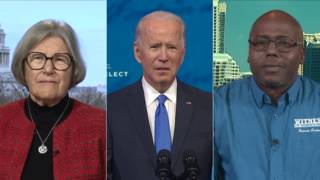Hi there,
I believe that people who are concerned about the climate catastrophe, economic and racial justice and war and peace, are not a fringe minority, not even a silent majority, but the silenced majority—silenced by the corporate media. That's why we have to take the media back—especially now. But we can't do it without your support. Thanks to a group of generous donors, all donations made today will be DOUBLED, which means your $15 gift is worth $30. With your contribution, we can continue to go to where the silence is, to bring you the voices of the silenced majority. Every dollar makes a difference. Thank you so much!
Democracy Now!
Amy Goodman
Hi there,
I believe that people who are concerned about the climate catastrophe, economic and racial justice and war and peace, are not a fringe minority, not even a silent majority, but the silenced majority—silenced by the corporate media. That's why we have to take the media back—especially now. But we can't do it without your support. Thanks to a group of generous donors, all donations made today will be DOUBLED, which means your $15 gift is worth $30. With your contribution, we can continue to go to where the silence is, to bring you the voices of the silenced majority. Every dollar makes a difference. Thank you so much!
Democracy Now!
Amy Goodman
Non-commercial news needs your support.
We rely on contributions from you, our viewers and listeners to do our work. If you visit us daily or weekly or even just once a month, now is a great time to make your monthly contribution.
Please do your part today.
HeadlinesJuly 29, 2019
Baltimore Pushes Back After Trump Calls City “Rodent Infested Mess” and Attacks Rep. Cummings
Baltimore residents and representatives are defending their city after President Trump described Baltimore as a “disgusting, rat and rodent infested mess” as he engaged in a Twitter attack against House Oversight Chair Elijah Cummings, one of the most prominent African-American lawmakers in Washington. Trump tweeted that Cummings’s district is “considered the Worst in the USA,” and “no human being would want to live there.” Trump’s attacks came after Fox News ran a story about Baltimore and after Cummings criticized the conditions of immigration jails along the Mexican border. An editorial in The Baltimore Sun Saturday was titled “Better to have a few rats than to be one.” On Saturday, CNN anchor Victor Blackwell choked up on air when discussing Trump’s comments about his hometown.
Victor Blackwell: “The president says about Congressman Cummings’ district that no human would want to live there. You know who did, Mr. President? I did, from the day I was brought home from the hospital to the day I left for college. And a lot of people I care about still do. There are challenges, no doubt, but people are proud of their community.”
Blackwell noted that Trump frequently used the dehumanizing word “infested” when describing people of color. We’ll have more on this story after headlines.
Gunman Kills 3, Injures 15 at Gilroy Garlic Festival in Northern California
In Northern California, a gunman killed three people and wounded at least 15 others at the annual Gilroy Garlic Festival Sunday. The gunman was also killed at the scene by police, who say they are on the hunt for a second suspect. One of the victims of the attack was a 6-year-old boy.
Shooting at Brownsville, Brooklyn, Block Party Kills 1, Injures 11
Meanwhile, in New York City, at least one person died and another 11 were injured after a shooting at a popular block party in Brownsville, Brooklyn, Saturday. The annual event draws people to the neighborhood from out of state for musical performances and other festivities. Police say they are looking for two suspects.
SCOTUS OKs Trump Plan to Use Military Funds for Border Wall
In a 5-4 ruling, the Supreme Court Friday allowed President Trump to move ahead with the use of $2.5 billion of military funds to build his wall on the U.S.-Mexico border after he declared a national emergency in February. Last month, a federal judge halted the move, saying Trump does not have the authority to circumvent Congress to appropriate the funds required for construction. In a statement, the ACLU responded by saying, “Border communities, the environment, and our Constitution’s separation of powers will be permanently harmed should Trump get away with pillaging military funds for a xenophobic border wall Congress denied.”
U.S. and Guatemala Sign Controversial Immigration Deal Despite Widespread Opposition
Meanwhile, in a surprise move, the Trump administration and the Guatemalan government signed what the White House says is a “safe third country” agreement Friday—despite widespread condemnation of the plan by human rights experts and injunctions by a Guatemalan court that halted the agreement from going ahead without approval from Congress. The agreement would require asylum seekers who journey through Guatemala en route to the United States to apply for asylum in Guatemala instead of at the U.S.-Mexico border. It would primarily affect Honduran and Salvadoran migrants. The signing of the deal took place following threats from Trump last week to impose tariffs and other penalties, including a possible travel ban, on Guatemala. Legal challenges are expected in both the U.S. and Guatemala. On Saturday, hundreds of Guatemalans gathered outside the presidential palace protesting the agreement and demanding the resignation of President Jimmy Morales.
Dir. of National Intelligence Dan Coats Resigns
President Trump announced Sunday that Dan Coats, the director of National Intelligence, has resigned. Coats and Trump have clashed over Mueller’s investigation and Trump’s frequent attacks on intelligence agencies. Earlier this month, Coats appointed Shelby Pierson as a new election security czar. Trump said he would nominate Texas congressmember and staunch ally John Ratcliffe to replace Coats. Trump was reportedly pleased by Ratcliffe’s questioning during last week’s House Judiciary hearing with Robert Mueller, in which Ratcliffe told the former special counsel, “Nowhere does it say that you were to conclusively determine Donald Trump’s innocence or that the special counsel report should determine whether or not to exonerate him.”
Brazilian President Bolsonaro Threatens Glenn Greenwald with Imprisonment
Brazil’s far-right President Jair Bolsonaro threatened journalist Glenn Greenwald with possible imprisonment Saturday, following recent reporting by Greenwald’s news website The Intercept implicating Justice Minister Sérgio Moro in a possible plot to smear and convict former Brazilian President Luiz Inácio Lula da Silva. Speaking to a reporter, Bolsonaro said Greenwald could not be deported because he was married to a Brazilian, but that he might be imprisoned instead. Journalists and press freedom activists blasted Bolsonaro’s threats, and Greenwald responded via Twitter: “Contrary to what the president says, he is not (yet) a dictator. He doesn’t have the power to order people to stop. To detain someone, you need to present evidence to a court showing that a crime was committed. That evidence does not exist.” Click here to see our interview with the Pulitzer Prize-winning Glenn Greenwald on The Intercept’s exposé of Sérgio Moro and the Operation Car Wash scandal.
Miners Raid Tribe in Brazil, Killing Leader as Amazon Suffers Mass Deforestation by Illegal Loggers
In northern Brazil, residents of a remote indigenous village say at least 10 heavily armed gold miners in military uniforms raided their community last week, stabbing a leader to death. The assault on the Wajãpi village came as new government data show that deforestation in the Amazon has dramatically increased since President Bolsonaro took office in January, losing more than 1,300 square miles of forest cover—a 39% increase over the same period last year. The drastic change is due to Bolsonaro’s rolling back of regulations and punitive measures on illegal logging. In May, a group of former Brazilian environment ministers warned, “We’re facing the risk of runaway deforestation in the Amazon.” One former minister said that Brazil was becoming an “exterminator of the future.”
Massive Hong Kong Protests Continue to Demand Democratic Reforms
In Hong Kong, police deployed tear gas and rubber bullets against pro-democracy protesters as mass demonstrations shook the semi-autonomous territory for the eighth straight week. Police say they arrested 49 protesters Sunday. The popular uprising started to demand the withdrawal of an extradition bill that would have sent people from Hong Kong to mainland China to face charges, but demands quickly grew for the resignation of Hong Kong’s leader Carrie Lam, an investigation into violence against demonstrators, and pro-independence reforms.
Bomb Attack Targeting Pres. Ghani’s Running Mate Kills 20 People in Afghanistan
In Afghanistan, at least 20 people were killed and 50 others wounded Sunday after suicide bombers targeted the offices of a leading vice-presidential candidate in the capital Kabul. The blasts preceded an hours-long gun battle that saw more than 150 civilians forced to evacuate the four-story office building. No group has claimed responsibility for the attack, which targeted Amrullah Saleh, Afghanistan’s former intelligence chief and running mate to President Ashraf Ghani, who’s seeking another term in elections scheduled for September 28.
Libya: 5 Medical Workers Killed at Hospital Near Tripoli
In Libya, the U.N.-backed Government of National Accord says an attack by a renegade general on Saturday killed five medical workers and wounded seven others at a field hospital outside Tripoli. It’s the latest deadly assault on Libya’s capital city by forces loyal to former Libyan General Khalifa Haftar, who already controls much of eastern Libya.
Activists, Human Rights Groups Protest Bahrain’s Execution of 2 Men
In Bahrain, a 22-year-old activist died Sunday after taking part in protests against the execution of two men despite calls from human rights groups and the United Nations to halt their killings. The young man’s cause of death is unknown, though activists say there were clashes with police during Saturday’s protests. Local authorities have said he died of natural causes.
The two executed men were convicted in a mass trial on terror charges last year, but human rights advocates say confessions were obtained through torture. Speaking to Al Jazeera, a Bahraini activist linked the timing of the executions to the recent announcement by the U.S. government that it was reinstating the federal death penalty. Maryam Alkhawaja said, “Gulf states always feel they need a green light to commit the violence they commit. If the U.S. is going to start federal executions again, the Bahrain government feels it has the green light to do the same.”
Meanwhile, in Britain, an activist who staged a protest against the executions Friday night on the roof of the Bahraini Embassy in London reportedly had to be rescued by British police after he was seized by embassy staff. The Bahrain Institute for Rights and Democracy, which organized the action, says that embassy staffers tried to throw the demonstrator off the roof and that he could be heard screaming after being apprehended. British authorities say they were not able to verify that account.
DOJ Approves T-Mobile and Sprint Merger
Back in the United States, the Justice Department approved the merger Friday of T-Mobile and Sprint, in a move that critics say would increase cellphone bills for consumers by decreasing competition. The Justice Department said they only approved the deal after T-Mobile and Sprint agreed to sell some of their assets to satellite TV provider Dish Network to create a new wireless network. Thirteen attorneys general and the District of Columbia are suing to block the $26 billion merger. Senator and 2020 candidate Elizabeth Warren tweeted, “This merger will cost thousands of jobs, reduce wages, and further reduce competition in a sector that badly needs it. We need antitrust regulators with the courage to stand up to monopolies.”
Judiciary Chair Nadler Seeking Mueller’s Grand Jury Materials as Dems Consider Impeachment
House Judiciary Chair Jerry Nadler said he will petition a federal judge to get access to former special counsel Robert Mueller’s secret grand jury evidence Friday, as his committee considers whether they will undertake impeachment proceedings against President Trump. Nadler also said he would sue former White House counsel Don McGahn as early as this week to compel his testimony. One hundred seven House Democrats have said they would back an impeachment inquiry—that’s just 11 short of a majority on the Democratic Caucus.
Colombians Protest Murders of Indigenous and Environmental Leaders
In Colombia, demonstrators took to the streets in more than 50 cities and towns Friday to protest a surge of lethal attacks on indigenous and environmental leaders. Since a historic peace accord was signed in 2016, over 400 human rights activists have been killed for their work combating illegal mining, drug trafficking and land restitution causes. This is activist Gloria Cuartas.
Gloria Cuartas: “Stop with the selective and systematic murder of activists, of men, of women, of indigenous people, of Afro-Colombians, farmers and students, who are defending the right to live on their territories, for the right of biodiversity to be respected, for the peace agreements to be respected.”
We’ll have more on this later in the broadcast.
Egan Bernal First Colombian and Youngest Cyclist to Win Tour de France
And finally, 22-year-old Egan Bernal has become the first Colombian to win the Tour de France. He is the youngest rider to win the race in 110 years. “This victory is not for one rider but for an entire country,” Bernal said.
Most popular
- 1
- 2
- 3
- 4
Non-commercial news needs your support
Please do your part today.











Media Options